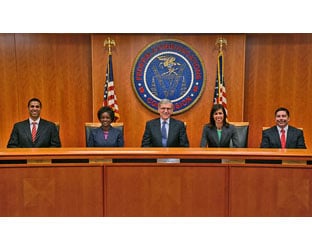As RBR + TVBR reported Thursday morning (12/15), FCC Chairman Tom Wheeler will step down and depart the Commission on Jan. 20, 2017 — the day that President-Elect Donald Trump takes office.
Where the Commission goes now is uncertain. However, the new Chairman will undoubtedly steer the FCC in a very different direction. With Wheeler’s exit coming after Democratic FCC Commissioner Jessica Rosenworcel‘s expected Jan. 3, 2017 departure after failing to get a reconfirmation vote in the Senate, the FCC will have a temporary 2-1 Republican majority.
Under a Trump administration, this could become a 4-1 GOP-dominated FCC, leaving Democratic Commissioner Mignon Clyburn — a one-time interim FCC Chairman herself — in a delicate spot.
In a statement, Wheeler called his three-year tenure as Chairman — “during this period of historic technological change” — the greatest honor of his professional life.
Wheeler added that he was deeply grateful to President Obama for the opportunity to serve as FCC Chairman, and is “especially thankful to the talented Commission staff for their service and sacrifice during my tenure. Their achievements have contributed to a thriving communications sector, where robust investment and world-leading innovation continue to drive our economy and meaningful improvements in the lives of the American people.”
He also called it a “privilege” to work with his fellow Commissioners “to help protect consumers, strengthen public safety and cybersecurity, and ensure fast, fair and open networks for all Americans.”
What do Inside-The-Beltway Communications attorneys think an FCC without Wheeler means for broadcasters? For one, relief for small businesses on the data-driven paperwork needed to comply with Federal regulations is hoped for.
Speaking with RBR + TVBR, Peter Tannenwald, an attorney at Fletcher, Heald & Hildreth, believes too many small-sized radio station owners are being financially pinched by the Commission.
“The small business spends a disproportionate amount of resources on paperwork,” Tannenwald says. “This is the result of a data-driven Commission, and it tips the balance. The FCC is not sufficiently aware of the costs that it imposes on the people it regulates.”
With Republican leadership — expected to come at first through an interim FCC Chairman widely to be Ajit Pai — relief is likely, and will be welcomed.
“All of the little family-owned radio stations are going to have a problem with taking the time to put together a public file,” if reform does not happen,” Tannenwald says. “What’s going to happen next? These small stations will need to hire an extra person just do deal with all of the paperwork.”
Aside from this sort of relief for AM and FM radio stations, Tannenwald believes it is hard to say what will happen.
“We really don’t know what Trump’s communications agenda will be,” he notes. “We won’t know until Trump defines his agenda a little better.”
We do know that net neutrality — the principle that internet service providers should enable access to all content and applications regardless of the source, and without favoring or blocking particular products or websites — will be challenged and struck, giving power to ISPs.
We do know that the set-top box plan suggested by Wheeler has gone up in flames.
What we don’t know is, if Trump style dictates what to expect, that he will delegate communications policy. “And that’s that,” Tannenwald says.
Meanwhile, Wilkinson Barker Knauer partner David Oxenford took to his blog to suggest what Wheeler’s departure from the FCC may mean for broadcasters.
For one, the restoration of a UHF discount may be seen. The FCC is now accepting comments on a petition for reconsideration of the Commission’s decision to repeal the discount for UHF broadcasters, which the Democratic majority nixed on the grounds that technology has rendered the discount outdated.
Republican commissioners Ajit Pai and Michael O’Rielly have been vocal in their dissents on the repeal, and it would not be surprising to see the repeal rescinded.
Then, of course, is the likely revisit of the FCC’s media cross-ownership rules, stuck in place since 1975. Both Pai and O’Rielly have expressed their disappointment in a lack of regulatory change, and with Clyburn the lone likely dissenter, it could finally be time for a newspaper to combine operations with a broadcast station in the same DMA.
“It is also possible that a formal petition for rulemaking on ATSC 3.0 would be released, as some TV operators have been pushing to move the next-generation of television closer to becoming a reality,” Oxenford says.
He also points out that Commissioner O’Rielly has suggested that EEO recruiting be moved online. Thus far, the FCC has not recognized that this alone is sufficient enough.
“I recently filed a petition on behalf of a client seeking that relief (see the petition here), so the FCC could move on that issue,” Oxenford writes.
Meanwhile, Commissioner O’Rielly has also suggested tougher enforcement actions against pirate radio operators. In the latest effort and most forceful effort in recent months to squelch this activity, the FCC proposed twin $25,000 penalties for unauthorized broadcasts in the San Fernando Valley of Los Angeles.
Oxenford also believes that, “in a broader sense, there may be reform of how the FCC does business.”
GOP Commissioners Pai and O’Rielly have suggested process reform, “to make the actions of the FCC more transparent so that interested parties know what issues are on the table and what rules are being considered before they are adopted,” Oxenford says.
“This is clearly important so that the rules, before they are adopted by the FCC, can be vetted by those affected to be sure that no inadvertent ‘gotchas’ result from imprecise language in the rule,” he continues. “Timing of FCC decisions is also important, so that the FCC expeditiously moves on matters that can affect the businesses of broadcasters and other regulated entities. It would also be expected that these Commissioners will be concerned with the costs of implementing regulations that are adopted – and especially how regulations affect the small companies to which they apply. So often rules are adopted that may make sense, or may be feasibly implemented, in large markets, but which are a real burden to those stations in smaller markets.”
RBR + TVBR




